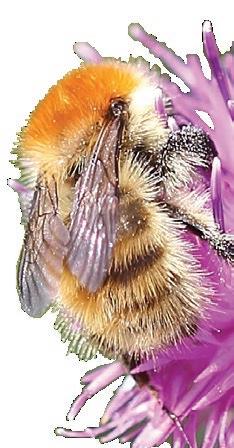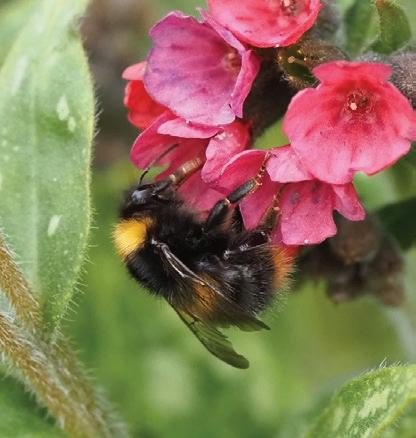Why protect our pollinators? Pollinators are declining globally
important ecological roles, e.g. providing fruits and seeds for birds and other wildlife, contributing
Along with many other insects, wild pollinators
to nutrient cycling (e.g. nitrogen fixation), and to
are declining in occurrence and diversity across
climate change adaptation. Furthermore, wild
North-West Europe1,2 . A 2006 assessment
pollinator conservation measures can directly
revealed that across the island, 30 of our 99
benefit other beneficial taxa, such as natural pest
bee species are at risk of extinction3. In Britain,
enemies that enhance biological control, and may
declines appear to be bigger in rare species and
play an important role in landscapes in terms of
those that require specific habitat types4. This is of
microclimate regulation, soil erosion prevention
serious concern because of the fundamental role
and in creating windbreaks11. Therefore, wild
wild pollinators play across natural and managed
pollinator conservation can represent a win-
ecosystems. The majority (78%) of European
win solution for tackling both the biodiversity
flowering plant species are animal pollinated5, as
loss and the climate crises.
are 71 of the 100 crops that provide 90% of the world’s food supply6. In Europe alone, 84% of the
To protect pollination service, we need to protect as much wild pollinator diversity as possible
264 crop species are animal pollinated and 4,000 vegetable varieties exist thanks to pollination by bees7,8. Across Europe, crop pollination accounts for nearly €15 billion of the total economic
Because different wild pollinator species are
value of crop production per year . In Ireland,
active at different times of day and at different
the annual value of animal pollination to home-
times of the year; have varying behaviour, body
produced food crops was recently estimated to
size and tongue length, flight distances, habitat
be up to €59 million per year10.
and foraging preferences, and susceptibility to
9
stressors, they vary in the plant species they
Wider benefits of pollinators
pollinate. Studies have shown that, around the world, crop pollination and yields increase
While wild pollinators, through the pollination
when there is more diversity of these traits
services they provide, are important for healthy
in agricultural systems, when there are more
diets, agricultural economies and nutritional
species of pollinators, and when pollinators are
security2, they also influence our lives in many
more abundant in general12,13. Overall, systems
more ways – pollinators affect ecosystem
that are more biodiverse tend to be more stable
structure, processes, and other ecosystem
and more resistant to changes in climate14. Thus,
services. Insect-pollinated plant species play
it is vital that we conserve as much of our wild pollinator species diversity as possible.
Global initiatives There has been recent widespread attention and enthusiasm for the protection and conservation of wild pollinators, particularly bees. In 2016, governments around the world approved the Intergovernmental Science-Policy Platform on Biodiversity and Ecosystem Services (IPBES) report on Pollinators, Pollination and Food Production2, which reviewed global value, status, risks and opportunities, and many have joined a global coalition to protect pollinators (www.promotepollinators.org). In 2017, the United
8
Anthidium manicatum, a solitary bee © Steven Falk













